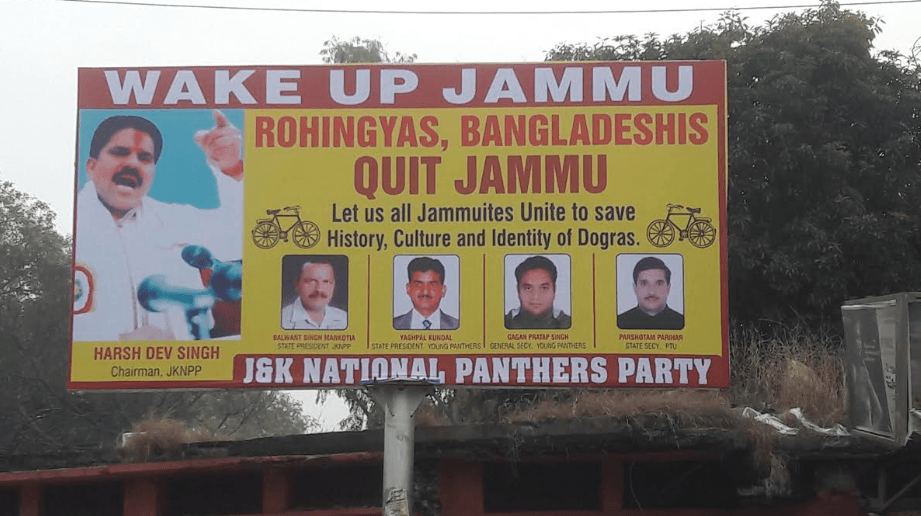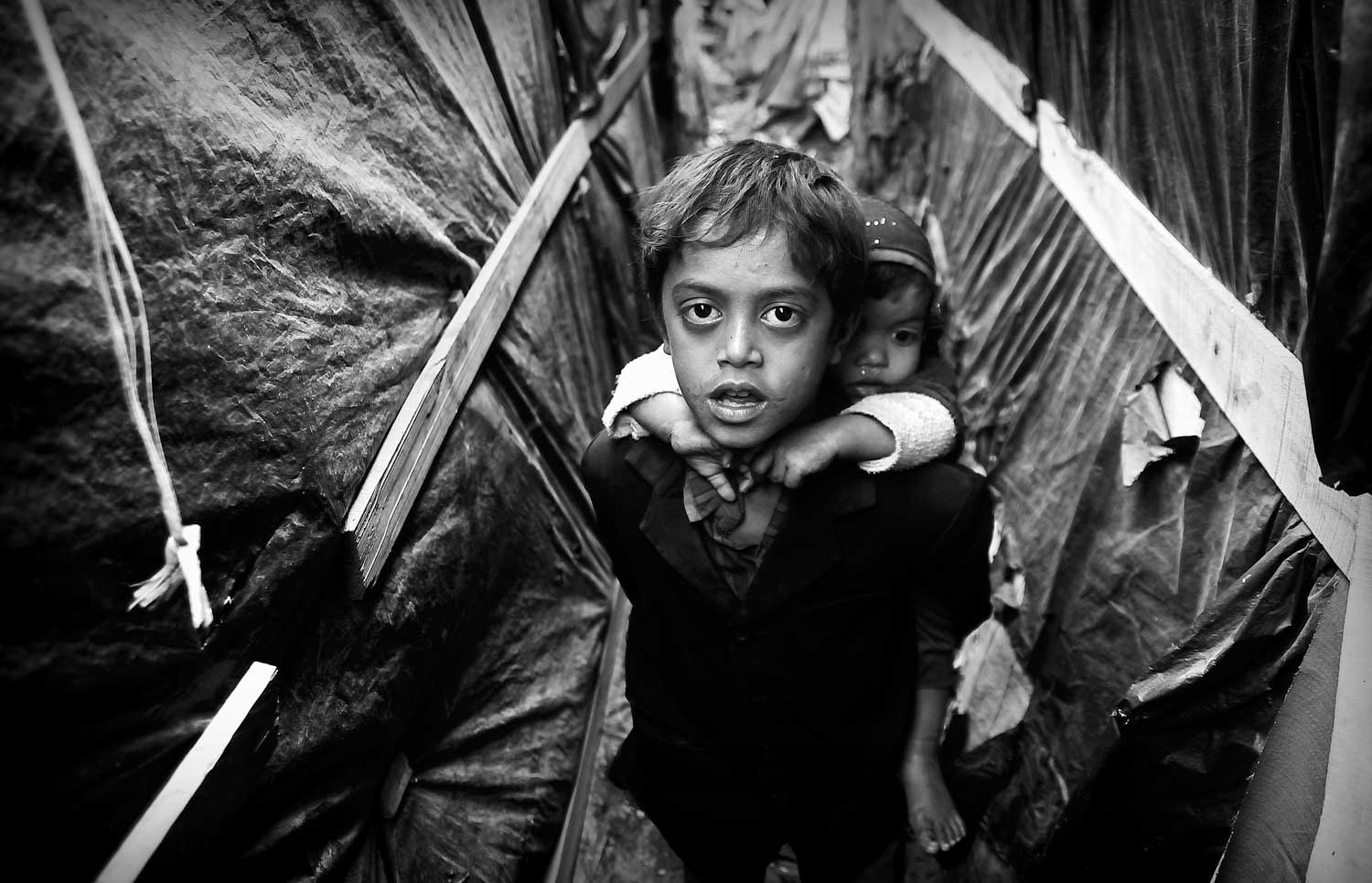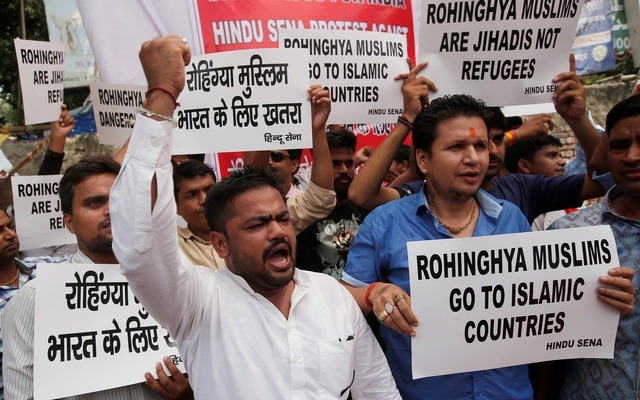Even as 5000 Rohingya Muslims are living in slums across Jammu bereft of proper living conditions, the United Nations refugee agency UNHCR is dealing with the crisis by changing partners than solely attending the persecution-freaked refugees at a time when they’ve been reduced to a mere raging political rant in the polarized region.
As he sits near a squalid camp sheltering his persecuted tribe—that walked miles, trekked mountains, threaded woods, waded waters in a bid to defy the pogrom back home—Habibullah (not his real name) recounts another tale of abandonment in the new country with new dynamics.
In a place where RSS’s sword-wielding road-shows and a solidarity rally in support of a pedophile-killer cop have become the norm, most of his tribe feels snubbed by the human rights defenders—claiming to work for their welfare, including the United Nations refugee agency, United Nations High Commissioner for Refugees (UNHCR).
Only last year, when the “Go Rohingya, Go” chants and the billboard threats were heightening communal tensions at Jammu, Habibullah came as mediator in Jammu on UNHCR program from Bangladesh, where he had been living for years.

“I could’ve ended with a better job or studied further to have a better livelihood,” says Habibullah, a graduate. “But the status of refugee, rather a person with no identification, has closed down all doors for me.”
This concern is rampant in his uprooted tribe—grappling with the larger identity crisis at the moment. A sense of abandonment runs high as the UNHCR is mainly outsourcing its welfare works to its partners who are unable to attend to the pervasive crisis. Lately, the UNHCR found a new partner in Save the Children to implement its refugee welfare works in Jammu.
As a global organisation ‘dedicated to saving lives, protecting rights and building a better future for refugees, forcibly displaced communities and stateless people’, UNHCR in an emailed reply to this reporter highlights its restricted operational scope in India. The UN body is only authorized to work in Delhi. It gets access to other places through its partners, thus making its operations jagged.
ALSO READ: Between the Devil and the deep blue sea, children of the Rohingya…
Since India was not a signatory to the 1951 UN Convention relating to the status of refugees and the 1967 protocol granting it a provision to extend long-term visa under various instructions issued by the government from time to time, therefore the UNHCR’s role as refugee agency stands limited in Jammu.
But even the UNHCR’s outsourced welfare work is being questioned by many. Somebody like Habibullah who’s a part of the organization says the real motive seems to have lost in transition. The welfare work infact came under sharp focus after Narendra Modi-led NDA government at New Delhi called for their deportation.
In an advisory issued in 2017, the Indian Home Ministry asked all States and Union Territories to identify the illegal Rohingya immigrants—declared as the world’s Most Prosecuted Communityby the UN—so as to initiate the process of their deportation.
Amid this growing concern for the Muslim refugees of Burma, UNHCR has registered around 17,000 of them in India, with one-third of them living in Jammu. But New Delhi puts their number at around 40,000—scattering around Jammu, Hyderabad, western UP, Mewat (Haryana), Delhi and Jaipur.

(FPK Photo/Sajad Rafeeq)
These people are unwanted at their ancestral homes and unsolicited by their neighbors, thus making them a People without a State. Among Myanmar’s 135 ethnic groups, Rohigyas have been barred from citizenship rights since 1982. Torture at the hands of Myanmar’s military drives them across the border in thousands to Bangladesh and India.
While the Hindu-dominated Jammu region demands their departure, Kashmir being a Muslim majority comes in support of Rohingyas, albeit verbally. This silent war within the two regions of a single state about Rohigya settlement has created a new political instability in the region. Lately, even the J&K Assembly Speaker, Kavindra Gupta—an RSS ideologue and BJP MLA—blamed Rohingyas for an attack on the army camp in Jammu.
ALSO READ: ‘Had to leave my father behind as he couldn’t run anymore’
This growing politicization has already shown its results. According to an official in the Jammu Development and Justice Initiative, the number of Rohingyas has gone down to 5000 from 7000, post the political rivalry on their stay in Jammu since last year when a trade body called for their open genocide and a political party raised billboards, calling for their expulsion from Jammu.
To tackle the Rohingya refugee crisis in Jammu, the UNHCR had started its refugee process in 2014 by enrolling Rohigyas and provided them with emergency assistance.

“Women lack proper sanitation facilities such as private bathing spaces and children have to walk miles to fetch water,” a recent UNHCR report states. “Rohingya refugees in India are poor and unskilled and are only able to find low-skilled jobs in the informal sector and sometimes face exploitation.”
In this scenario, these refugees are forced to do minimal jobs to feed their family. Their children are often seen roaming in camps, collecting trash or doing household chores.
ALSO READ: It’s ‘snacks for scrap’ in this Rohingya slum in Jammu
“There’s need of more interventions to help the refugees in living a better life which at least gives them access to basic life necessities,” says Ravi Hemadri, one of the trustees of Jammu Development and Justice Initiative that worked in partnership with UNHCR till 2017.
Besides the issues of funds, the major problems that exist on the ground, both for UNHCR and refugees, are lack of proper representation within refugees as they’re not well organized.
But as Habibullah continues to play his role as UNHCR mediator in Jammu, he doesn’t seem to be hopeful for the betterment of his tribe.
“It’s like we fled persecution back home only to seek asylum in the region where political parties are literally baying for our blood,” he says, taking an absorbed look at the slum that his tribe has come to dwell in exile.
Like this story? Producing quality journalism costs. Make a Donation & help keep our work going.














